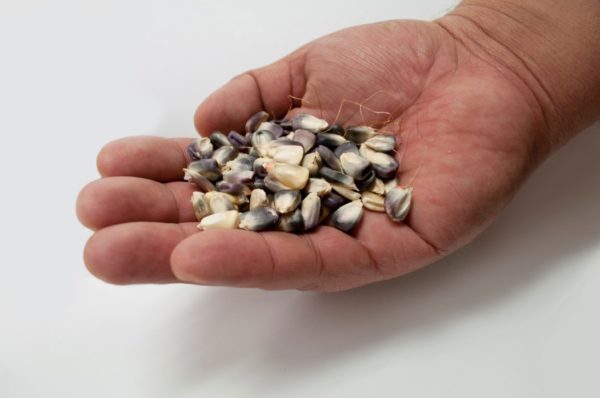
- Details
- By Native News Online Staff
TAHLEQUAH, Okla. — Nine varieties of heirloom seeds that predate European settlement in North America have been sent to the Svalbard Global Seed Vault in Norway by Cherokee Nation.
The seeds’ journey across the Atlantic Ocean came as the result of Luigi Guarino, director of science for the Global Crop Diversity Trust, contacting the Cherokee Nation’s Senior Director of Environmental Resources Pat Gwin after hearing about Cherokee Nation’s heirloom seed bank program on National Public Radio last year.
“He sent me an email and said they would be honored to have the tribe’s seeds in the seed vault,” said Gwin. “This is a tremendous opportunity and honor for the tribe. Additionally, knowing the Cherokee Nation’s seeds will be forever protected and available to us, and us only, is a quite valuable thing indeed.”
The Cherokee Nation is the first tribe in the United States to receive an invitation to deposit its traditional heirloom seeds to the Svalbard Global Seed Vault, a long-term seed storage facility housed deep inside a mountain on a remote island in Norway.
The nine varieties include Cherokee White Eagle Corn, the tribe’s most sacred corn, which is typically used during cultural activities. The seeds also include three other varieties of corn grown for consumption in distinct locations to keep the strains pure. Other seeds sent to the seed bank include Cherokee Long Greasy Beans, Cherokee Trail of Tears Beans, Cherokee Turkey Gizzard black and brown beans, and Cherokee Candy Roaster Squash.
“This is history in the making, and none of it could have been possible without the hard work of our staff and the partnership with the team in Norway,” said Cherokee Nation Principal Chief Chuck Hoskin Jr. “It is such an honor to have a piece of our culture preserved forever. Generations from now, these seeds will still hold our history and there will always be a part of the Cherokee Nation in the world.”
The Svalbard Global Seed Vault preserves seed and crop diversity in the case of an agricultural hardship or global catastrophe that would leave future generations without food supplies. The vault has the capacity to store 4.5 million varieties of crops and currently holds more than 980,000 samples from nearly every country in the world.
Svalbard will host its largest seed deposit event on Feb. 25 when it stores the 2020 collection of seeds, including Cherokee Nation’s. Learn more about the Svalbard Global Seed Vault online at https://www.croptrust.org/our-work/svalbard-global-seed-vault/.
The Cherokee Nation also began dispersing its limited supply of heirloom seeds to Cherokee Nation citizens on February 3. Cherokee Nation citizens are limited to two varieties of seeds.
More Stories Like This
Native News Weekly (August 25, 2024): D.C. BriefsNavajo Nation Mourns the Passing of Former Vice President Rex Lee Jim
Deb Haaland Earns Endorsement From Communications Workers of America Local 7076
University Soccer Standout Leads by Example
Two Native Americans Named to Democratic Congressional Campaign Committee's“Red to Blue” Program
Help us defend tribal sovereignty.
At Native News Online, our mission is rooted in telling the stories that strengthen sovereignty and uplift Indigenous voices — not just at year’s end, but every single day.
Because of your generosity last year, we were able to keep our reporters on the ground in tribal communities, at national gatherings and in the halls of Congress — covering the issues that matter most to Indian Country: sovereignty, culture, education, health and economic opportunity.
That support sustained us through a tough year in 2025. Now, as we look to the year ahead, we need your help right now to ensure warrior journalism remains strong — reporting that defends tribal sovereignty, amplifies Native truth, and holds power accountable.
 The stakes couldn't be higher. Your support keeps Native voices heard, Native stories told and Native sovereignty defended.
The stakes couldn't be higher. Your support keeps Native voices heard, Native stories told and Native sovereignty defended.
Stand with Warrior Journalism today.
Levi Rickert (Potawatomi), Editor & Publisher

